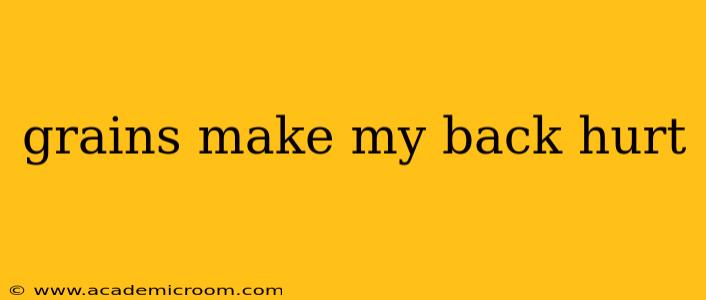Grains and Back Pain: Uncovering the Connection
Many people experience back pain, and while the causes are diverse, some suspect their diet plays a role. This article explores the potential link between grains and back pain, examining different perspectives and offering evidence-based insights. It's crucial to remember that correlation doesn't equal causation, and individual experiences can vary greatly. This information is for educational purposes and shouldn't replace professional medical advice.
What types of grains might cause back pain?
This is a complex question with no simple answer. Back pain is rarely caused directly by a single food, but certain grain types could contribute indirectly to back issues through various mechanisms. For example, some individuals may experience inflammation from gluten-containing grains like wheat, barley, and rye (in the case of celiac disease or non-celiac gluten sensitivity). Inflammation, in general, can worsen existing back pain or contribute to muscle stiffness. Similarly, highly processed grains often lack crucial nutrients, potentially leading to deficiencies that indirectly affect bone health and muscle function.
Could gluten be the culprit?
Gluten sensitivity and celiac disease, both affecting the way the body processes gluten, are potential factors. While not directly causing back pain, the inflammation these conditions trigger can affect the entire body, including the back. Symptoms can range from mild discomfort to severe pain and inflammation. If you suspect gluten sensitivity might be a factor in your back pain, it's crucial to consult a gastroenterologist or doctor for proper testing and diagnosis.
Are certain grains more inflammatory than others?
The glycemic index (GI) of grains is important here. High-GI grains, which cause rapid blood sugar spikes, can lead to inflammation in some individuals. While research on the direct link between high-GI grains and back pain is limited, chronic inflammation is known to contribute to several musculoskeletal issues. Opting for lower-GI grains like oats or barley (in moderation for those with gluten sensitivity) might be a beneficial dietary adjustment.
How can diet influence back pain?
Back pain is often linked to nutritional deficiencies impacting bone density, muscle strength, and overall body function. A diet lacking in essential nutrients can weaken the back's supporting structures, making it more susceptible to injury and pain. Ensuring a balanced diet rich in calcium, vitamin D, magnesium, and other essential vitamins and minerals is vital for maintaining strong bones and muscles, which can lessen the risk of back problems.
Could it be something other than grains?
It's essential to consider that numerous factors contribute to back pain, often in combination. Poor posture, lack of exercise, obesity, underlying medical conditions (such as arthritis or spinal stenosis), and even stress can all be significant contributors. Therefore, attributing back pain solely to grain consumption without considering other lifestyle factors would be an oversimplification.
What should I do if grains seem to be causing my back pain?
If you suspect a link between grain consumption and your back pain, consult your doctor or a registered dietitian. They can help determine if underlying conditions like gluten intolerance or nutritional deficiencies are contributing factors. A careful dietary review and appropriate testing can rule out other causes and establish a personalized plan to manage back pain more effectively. Eliminating suspect grains gradually and monitoring any changes in pain levels can offer valuable insights but should always be done under professional guidance.
Disclaimer: This article provides general information and shouldn't be considered medical advice. Always consult a healthcare professional for diagnosis and treatment of back pain or any health concerns.
